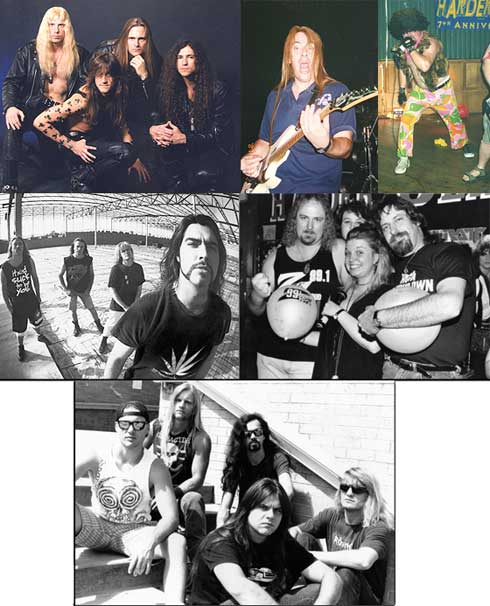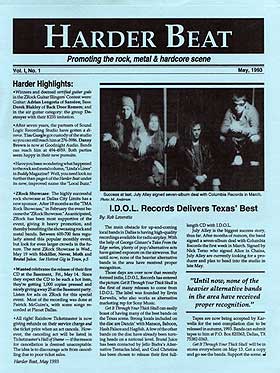| The rest of the country, though, was enamored with grunge and the re-emergence of punk. The hard fall of hair metal in the early 90s left a bad taste for long hair, black leather and wild stage shows in the mouths of the masses. Hordes of bands who wore flannel shirts and stared at their shoes while they played took over the airwaves and the arena stages. Once proud metal/hard rock stations like the nationwide Z-Rock, LA’s KNAC and Texas staples Q102, KZEW and later KEGL changed formats or shut down altogether. Headbanger’s Ball was dropped from MTV. Clubs in major cities either stopped booking metal acts or closed their doors for good.
By the late 90s, the pandemic started really taking its toll in North Texas. All of the aforementioned clubs closed down. Deep Ellum — which long featured rock clubs like On The Rocks (later The Rock), July Alley, The Galaxy Club, Trees, the Gypsy Tea Room and Club Clearview — began its downward spiral. One by one, new clubs tried to take the reins, but eventually succumbed to the anti-metal backsplash. The Sanctuary rose and fell in both Arlington and Deep Ellum. The Inferno (Denton) burned out. The Rage, Graffiti’s, Indigo, Loose Change, The Vampire Lounge, The Underworld, the Hard Rock Café, and the Tattoo Bar, Caravan of Dreams and Axis in Fort Worth — even the mighty Bronco Bowl (and the Canyon Club inside) was reduced to rubble —or rather a Home Depot — by the end of the decade.
On the national front, grunge was replaced by pseudo-punk, which gave way to rap rock. That gave birth to ‘nü metal,’ which spawned goth and emo before it drowned in a sea of bands that all sounded like Creed. Until Ozzfest started up in 1997, metal was all but lost on the musical landscape.
Yet in Dallas, one entity and one entity only kept the flag raised high throughout the good times and bad. Only one source gave bands a place to get their name known and advertise their gigs. Fans had only one outlet from which to keep their finger on the pulse of extreme music everywhere: Harder Beat. Major bands from across the globe would say in interviews how lucky Dallas was to have such a resource, because there was nothing like it in LA, New York, Chicago or Miami.
So here we are fifteen years later. Heroes have come and gone. Trends have risen and fallen. Clubs have opened and closed their doors. Other magazines have been forgotten. Radio has become a corporate whore, as iTunes and the internet have changed the way we get our music. Our music, and our lives, have all changed dramatically. Hell, metal is even ruling the charts again. But now, just as then, the one thing that D/FW musicians and music fans can count on is that first weekend of the month when HB hits the stands at the clubs, shops, rehearsal and recording studios, record and music stores.
We outlived them all, raising a brazen middle finger to all the corporate swine with one hand and throwing up the devil horns to all our rock and roll brethren with the other! HB loudly and proudly promotes not only metal, extreme and alternative music, but everything that rocks.
People ask all the time why we do it. How can we devote such effort and time (for such very little money) in addition to our day jobs, bands, families and other commitments? The answer is simple. It is what we love. It is what we believe in. It is more than music. It is more than a trend. It is a lifestyle. It is a passion. Hey, if it were easy, everybody would be around for fifteen years...
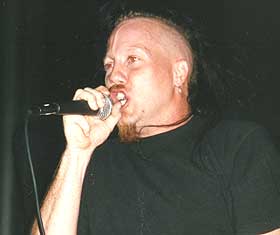
Phantom X’s Kevin Goocher (with Corrupted Innocence) in 1993
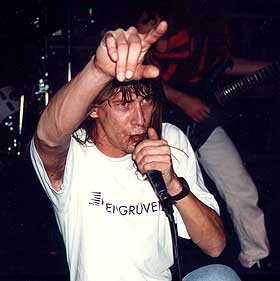
Hot Ash’s Kevin Dell Greer (with Strangers) in Hell Goat’s Alapeno (with Big Iron) in 1998 1996
|
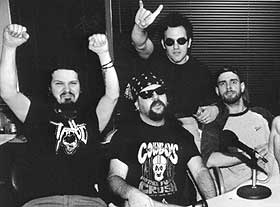
Pantera at the Vulgar Display Of Power CD release party (from HB’s April 1994 issue).
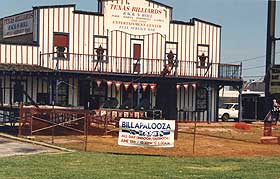
Texas Billiards circa 1995
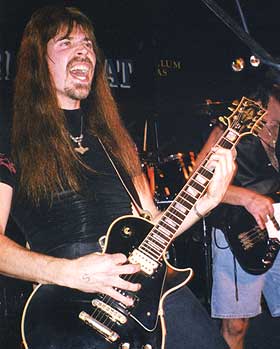
Drowning Pool’s CJ Pierce (then with Endangered Species) in 1999
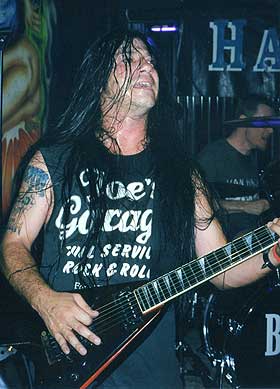
Hell Goat’s Alapeno (with Big Iron) in 1998
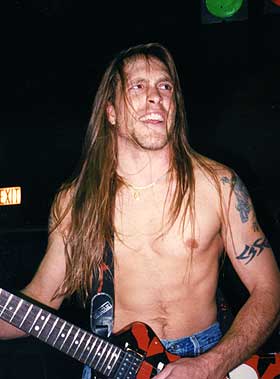
Sik’s Dano Hibbs (then with Bone Tripp) in 1997
|
